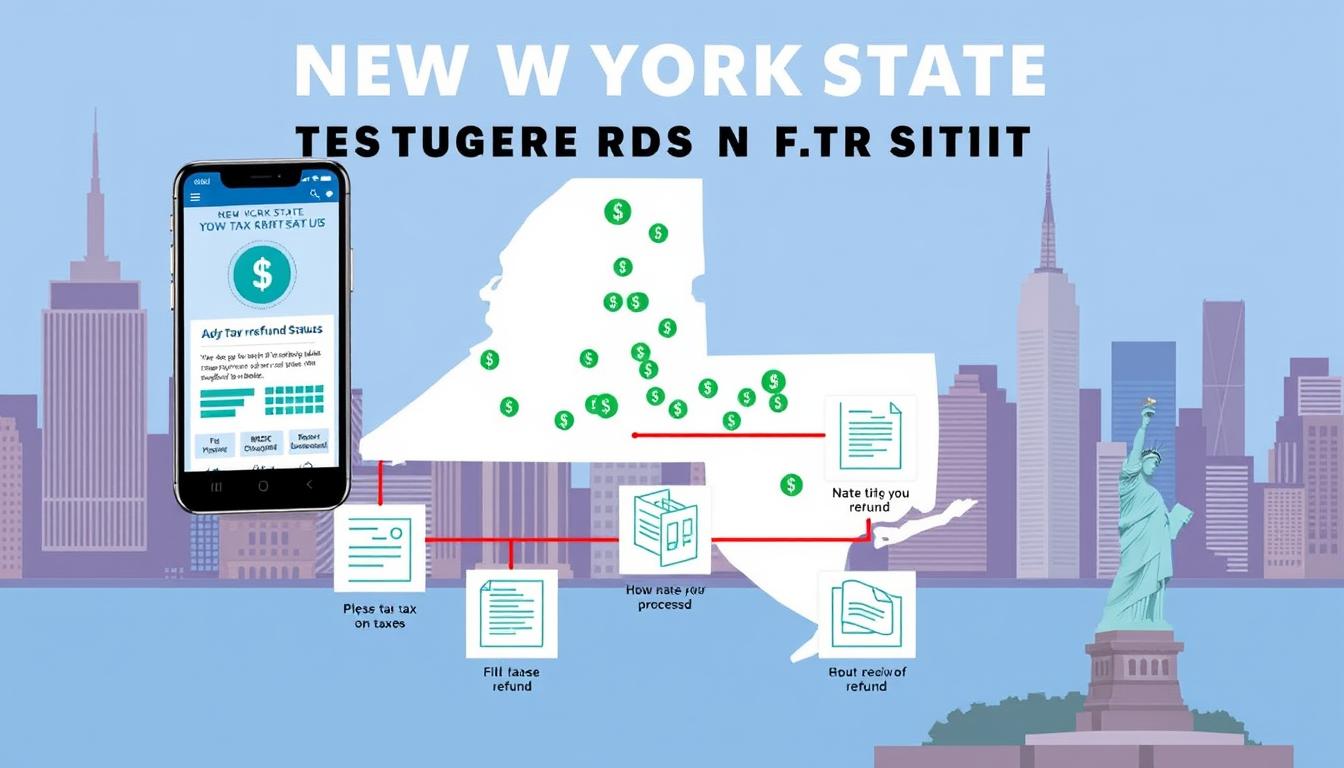Amish property owners pay property taxes like anyone else, based on the assessed value of their homes and farmland. They value simplicity, so they often prefer cash payments. These tax payments help fund essential public services, including schools and roads, reflecting their commitment to civic duty. While there are no specific exemptions for the Amish, they may use agricultural assessments to lower their tax burden. However, rising property values and complex tax codes can create challenges for Amish families, especially those relying on farming. There's more to discover about how these factors impact their communities.
Key Takeaways
- Amish property owners pay real estate taxes based on assessed property value, similar to other homeowners.
- They typically prefer cash payments to align with their values of simplicity and self-sufficiency.
- Agricultural use assessments may reduce the taxable value of farmland, helping to manage tax burdens.
- Amish families face additional tax obligations, including income and sales taxes, despite their traditional lifestyle.
- Property tax payments contribute to essential public services, reflecting their commitment to community welfare.
Overview of Property Tax Obligations

When it comes to property tax obligations, the Amish are just like any other property owners, meaning they're responsible for paying real estate taxes imposed by local governments. These taxes are based on the assessed value of the property, which local tax authorities determine. As a result, the Amish must navigate the same tax landscape as their neighbors.
The taxes they pay fund essential public services such as schools, roads, and emergency services. This underscores their commitment to civic duty, as they recognize the importance of contributing to the broader society, even if they may not directly utilize all these services. Additionally, the Amish community owns significant amounts of farmland and property, which further emphasizes their role in local economies.
By complying with tax laws, the Amish help maintain local infrastructure, promoting a balanced relationship with taxation. Though they live a unique lifestyle, the Amish don't receive specific exemptions from property taxes.
They pay their real estate taxes through the same methods as other citizens, whether by visiting county offices in person or mailing cash or checks. This commitment to fulfilling their tax obligations highlights their understanding of the role taxes play in supporting community welfare, ensuring they remain responsible members of society.
Types of Properties Subject to Tax

Property taxes apply to various types of real estate owned by the Amish, just like any other community members. Residential properties, including single-family homes and multi-family dwellings, are subject to property taxes based on their assessed value. These taxes support local services such as public schools and emergency services, and ownership by Amish families doesn't exempt these properties from taxation. In fact, the Amish community pays taxes, though some taxes are mandatory despite their unique lifestyle.
Agricultural properties, primarily farmlands used for farming and livestock, also incur property taxes. While agricultural use assessments can lower the taxable value, these properties still contribute to the tax base. Even if Amish farms aren't commercial operations, they face property tax obligations.
Amish-owned businesses, like workshops and craft shops, fall under property tax regulations too. These properties are assessed based on market value and usage, helping fund public services and local infrastructure.
Lastly, community and public properties, including buildings and schools, may be taxed unless specific exemptions apply. Properties used for communal purposes are assessed accordingly, contributing to the local tax base.
However, exemptions exist for properties solely used for charitable, religious, or educational purposes that meet state criteria.
Financial Impact on Amish Families
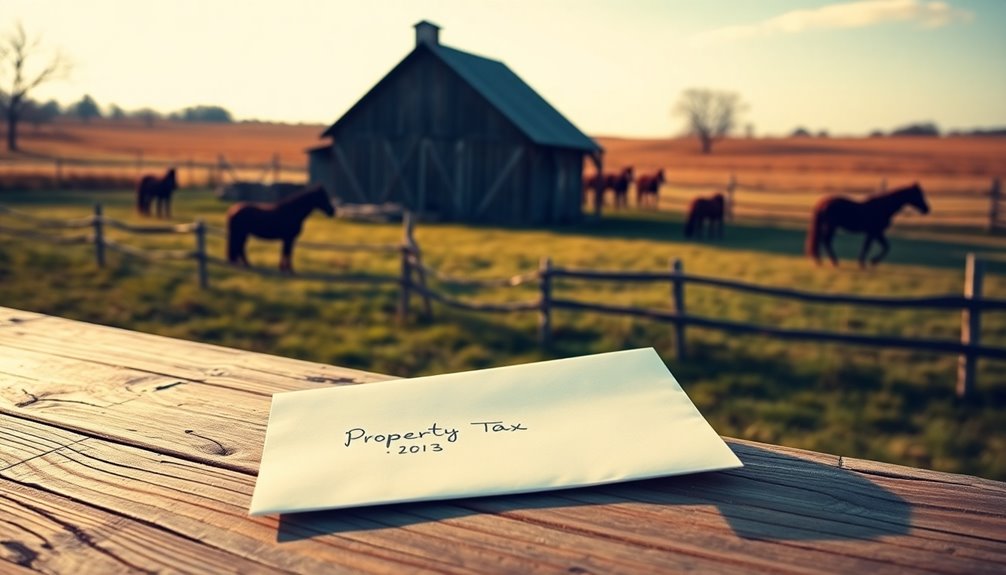
The financial impact of property taxes on Amish families can be significant, especially given the extensive land they often own for farming. Property taxes create a considerable burden, as the tax assessed on their land doesn't account for the income generated from it, making it challenging for families focused on subsistence rather than commercial farming.
Many Amish families struggle to meet these tax obligations since their farms primarily support family and community needs. Despite these challenges, the Amish comply with tax payments through traditional methods, often preferring cash to align with their avoidance of modern financial systems. They can apply for agricultural use assessments to lower the taxable value of their farmland, helping to ease the financial strain. This approach reflects their commitment to civic duty while managing their resources effectively. Additionally, it is important to note that Amish individuals pay income tax, which further contributes to their financial responsibilities.
While property taxes contribute to local infrastructure and services, such as roads and public utilities, the Amish community typically doesn't utilize these services. Nevertheless, they view these payments as a necessary part of supporting their local society, maintaining their integration within the broader community while adhering to their unique lifestyle and beliefs.
Comparison With Other Tax Obligations
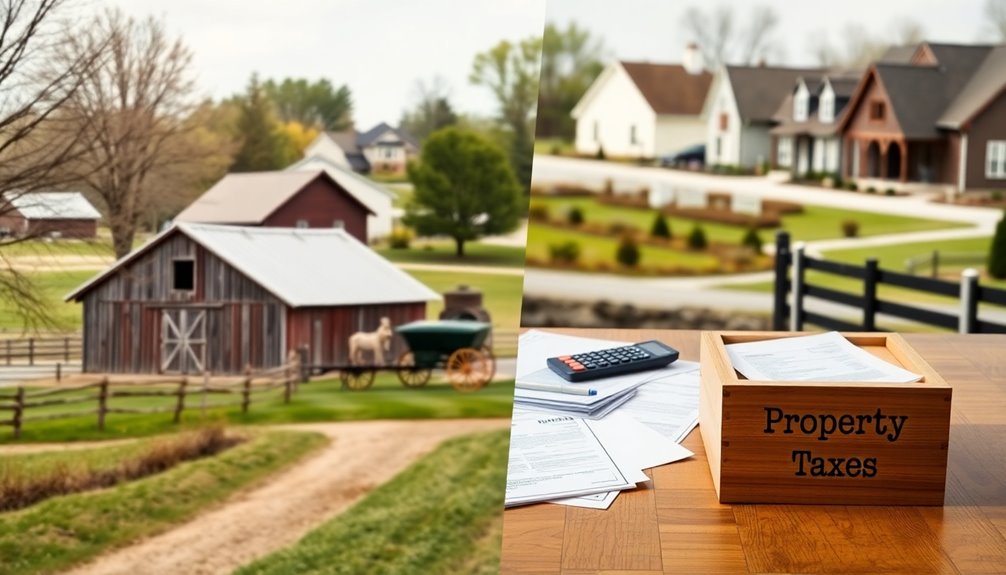
Many Amish families face various tax obligations beyond property taxes, including income and sales taxes, which can further impact their financial situation.
Like other citizens, you must pay federal and state income taxes on earnings from farming, carpentry, and other trades. Your tax responsibilities include reporting income, filing annual tax returns, and paying necessary taxes based on your income bracket. Unfortunately, there are no exemptions for income taxes due to Amish beliefs, and you must comply with standard filing processes.
When it comes to sales taxes, you also pay these on personal items, building materials, and agricultural supplies. Although most states require sales tax collection, there's no relief based on your beliefs. If you operate a business, you'll need to collect and remit sales taxes just like any other business owner. Additionally, the Amish communities participate in tax systems while maintaining certain exemptions, which underscores their commitment to fulfilling tax obligations.
In addition to these tax obligations, you're subject to audits and regulations just like other taxpayers. Although you might seek legal ways to reduce your overall tax burden, your obligations remain significant, contributing to public services that benefit the broader community.
Local and State Tax Regulations
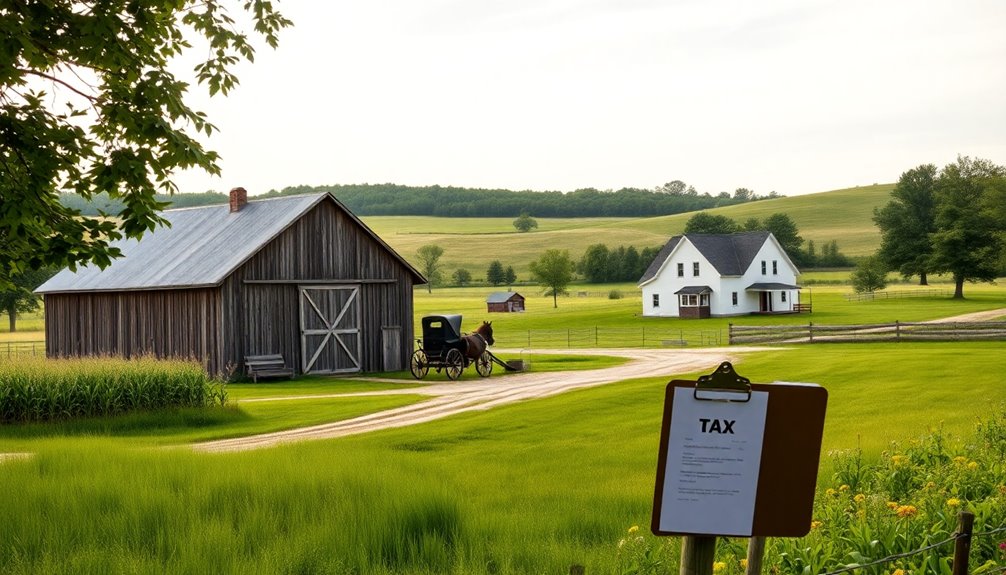
Local tax regulations play a crucial role in determining how Amish families manage their property taxes. In states like Pennsylvania, Ohio, and Indiana, property taxes are levied by local governments based on the assessed value of properties. Local tax authorities conduct assessments to evaluate homes, farms, and businesses owned by the Amish, just as they do for all property owners.
It's important to note that no statutes in states such as Missouri and Iowa exempt the Amish from paying property taxes. This means that Amish families must comply with the same local tax laws as everyone else. The taxes they pay fund essential public services, including schools, roads, and emergency services, benefiting the broader community. Additionally, Amish families contribute to local economies through their businesses, which are subject to sales tax compliance.
Amish families often pay real estate taxes through methods familiar to other citizens, such as in-person payments at county offices or mailing cash and checks. While there are no specific exemptions available, Amish property owners can utilize agricultural use assessments to potentially lower the taxable value of their farmland.
Community Support and Self-Reliance

Amish communities thrive on a foundation of mutual support and self-reliance, fostering a lifestyle that emphasizes economic independence while actively contributing to local society. By paying property taxes, you help maintain essential local services like roads, schools, and emergency services that benefit everyone, including your community.
Even though your children attend private Amish schools, you recognize the importance of supporting the broader society through these contributions. Your sense of civic duty drives you to comply with tax laws, reflecting your commitment to being a good neighbor and citizen.
You typically prefer to pay taxes in cash, aligning with your values of simplicity and avoidance of modern financial systems. While you don't have specific exemptions, you can utilize legal methods, such as agricultural use assessments, to manage your tax burden effectively. Furthermore, the principles of sustainable practices encourage responsible land use, which aligns with your community values and reduces long-term costs.
Self-reliance is a core value, but you also understand the necessity of contributing to local infrastructure. This balance between independence and community support strengthens your community's fabric, ensuring that you and your neighbors thrive together while adhering to your religious beliefs and maintaining your distinct lifestyle.
Importance of Property Taxes
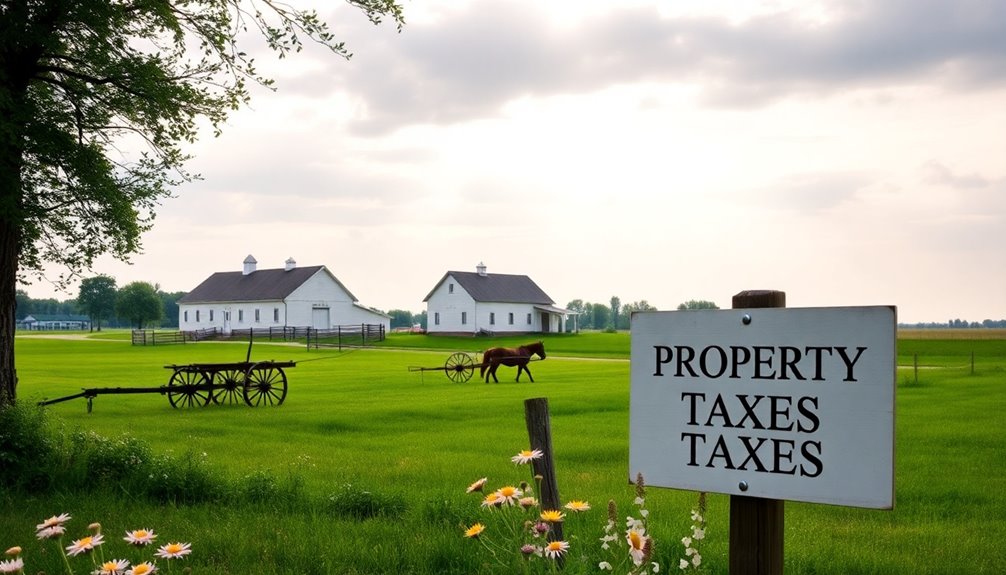
Property taxes play a crucial role in funding essential services that keep communities running smoothly. These taxes provide the necessary revenue for local governments, accounting for more than 30 percent of total state and local collections. They support critical services like roads, schools, police and fire departments, and emergency medical services.
Even though the Amish often use their own private schools, property taxes still contribute to public education funding. In fact, property tax revenue is often used to support both public and private educational institutions within a community.
Maintaining and improving local infrastructure is another vital function of property taxes. They help keep roads and utilities operational, impacting the overall quality of life in your community. When you buy, rent, or invest in property, property taxes shape housing markets and influence your financial decisions.
Moreover, changes in property taxes can affect economic stability and community development. They dictate the cost of living in your area, influencing your residential choices and investments.
Local governments rely heavily on the consistent collection of these taxes to ensure services and infrastructure remain intact. By understanding the importance of property taxes, you can appreciate their impact on your community's well-being and development.
Challenges Faced by Amish Communities
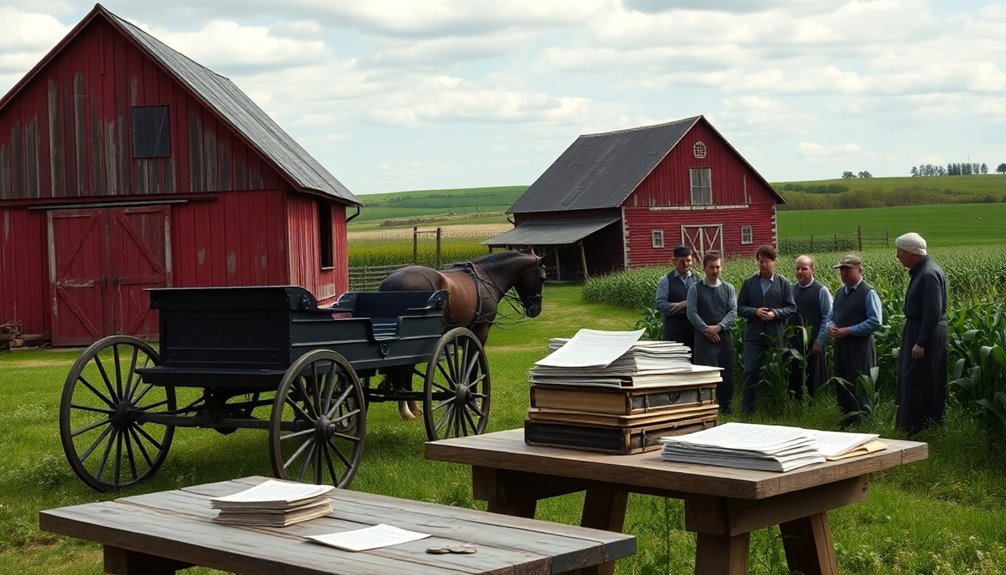
Facing numerous challenges, Amish communities grapple with financial burdens that stem from property taxes on their extensive farmland and properties. These taxes can be a heavy weight, especially as urban development pushes property values higher.
You might find it surprising that the tax assessment doesn't account for the income generated from the land, which often supports family and community needs rather than commercial pursuits.
Smaller Amish settlements particularly struggle. They often lack the financial resources to keep up with rising taxes and the costs associated with maintaining traditional farming practices. Compliance with tax laws adds another layer of difficulty. Low rates of homelessness in the Amish community may provide some stability, but financial strains can still threaten this balance.
Without modern technology, like computers, it's tough to navigate complex tax codes, especially for those running small businesses.
Healthcare costs compound these challenges. Many communities don't participate in Medicare or carry health insurance, leading to a reliance on pooled community funds.
As you can see, rising medical expenses strain resources, particularly in smaller settlements. Environmental regulations and economic changes further complicate matters, forcing Amish families to balance their traditional way of life with increasing financial and regulatory pressures.
Contributions to Public Services
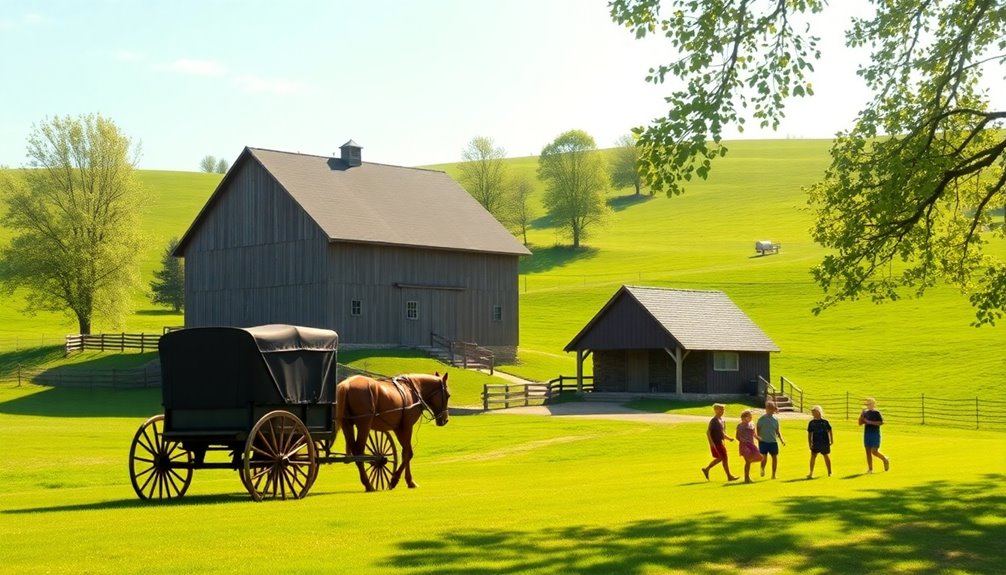
While many may not realize it, paying property taxes plays a crucial role in funding essential public services within Amish communities. The Amish pay property taxes on their homes and farmlands, just like everyone else. Local governments levy these taxes based on the assessed value of the properties, which local tax authorities evaluate to ensure fairness. Additionally, the current Amish population exceeds 250,000 across nearly 2,000 church districts, highlighting their significant contributions to local economies.
Even though the Amish often prefer their private schools, they contribute to the funding of public education through their tax payments. Additionally, these taxes help maintain vital services such as roads, emergency response teams, and public utilities that benefit the entire community.
You might think that because the Amish lead a distinct lifestyle, they wouldn't contribute much to the broader society, but that's not the case. They view paying property taxes as a civic duty and a way to support their neighbors.
Frequently Asked Questions
How Do Amish Families Assess Their Property Value for Taxes?
When assessing property value for taxes, you'll find that local tax authorities evaluate your property based on its market value.
They consider factors like the size of your land, any structures, and the absence of modern amenities.
Appraisers may use different valuation methods, like the market approach for comparable sales or the income approach for rental properties.
You'll want to ensure your property characteristics are accurately represented to achieve a fair assessment.
Do Amish Communities Have Any Representation in Local Tax Decisions?
You'll find that Amish communities don't have formal representation in local tax decisions.
They typically avoid government involvement, focusing instead on complying with tax laws. Local tax authorities handle assessments and collections without input from the Amish.
While they adhere to the same regulations as other property owners, their approach emphasizes obedience over influence.
This means they follow existing policies rather than seeking changes or special considerations in the tax system.
What Payment Methods Do Amish Use for Property Taxes?
When it comes to paying property taxes, you can use several methods. You might pay in person at your county office or send payments via mail using cash or checks.
Local tax authorities handle these payments, ensuring the process is consistent for all property owners. You won't find any special exemptions or unique payment methods, as everyone, including the Amish, follows the same standard procedures for tax payments.
Are There Any Financial Assistance Programs Available for Amish Property Taxes?
There aren't any specific financial assistance programs available for Amish property taxes.
You won't find exemptions based on their religious beliefs, either. General programs for veterans or seniors don't apply to them.
If you're part of an Amish community, you'll likely rely on your own resources or community support to manage these expenses.
Local tax relief options may exist, but they typically aren't targeted toward Amish property owners.
How Do Property Tax Appeals Work for Amish Property Owners?
If you're an Amish property owner looking to appeal your property taxes, you'll need to file a petition with the Board of Appeals.
You can submit your petition electronically through the Online Petition Center. Remember, you must provide supporting documents and evidence electronically.
The burden of proof is on you, except in cases of fraud. If you disagree with the Board's decision, you can appeal further to the Board of Finance and Revenue.
Conclusion
In conclusion, understanding how the Amish pay property taxes reveals their commitment to community and self-reliance. Despite facing unique challenges, they navigate local and state regulations, ensuring they contribute to essential public services. While their approach may differ from mainstream practices, it highlights their dedication to maintaining their way of life while fulfilling their tax obligations. Ultimately, the Amish demonstrate that even in a traditional lifestyle, supporting community infrastructure remains a priority.



